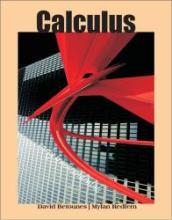Search Results: 1 - 10 of 6895
display
Calculus
Author(s): Mylan Redfern Betounes, David Betounes
NOTE: This version of the authors’ calculus book was previously titled: “Calculus: Concepts & Calculations-Non-CAS Version.” The book presents the essential calculus material using a traditional approach and organization of the canonical collection of concepts. The writing style is clear and con...Calculus with Maple
Author(s): David Betounes, Mylan Redfern
NOTE: This version of the authors’ calculus book was previously titled: “Calculus: Concepts & Calculations.” It is identical to the authors’ present title: Calculus, but has in addition the Maple code and Special-Purpose Maple procedures to produce the animations and figures that are an essential dy...Calculus Single Variable Solutions Manual
Author(s): Mylan Redfern, David Betounes
This Solutions Manual was written completely by the Authors. This means that it has the same problem- solving format as the textbook and, unlike other solutions manuals, provides more details, more steps toward the solutions, and more commentary and background. The figures and graphics are first-rat...Calculus Multivariable Solutions Manual
Author(s): Mylan Redfern Betounes, David Betounes
This Solutions Manual was written completely by the Authors. This means that it has the same problem- solving format as the textbook and, unlike other solutions manuals, provides more details, more steps toward the solutions, and more commentary and background. The figures and graphics are first-rat...Professional Catering: The Modern Caterer's Complete Guide to Success
Author(s): Stephen Shiring, Elizabeth J. Shiring
Professional Catering structurally applies by design key essential and emerging management, marketing, strategic management, and supply chain concepts empowering the student, practitioner, event planner, chef, or aspiring entrepreneur with the appropriate knowledge, tools, and Tips from the Trade to...about product
A Constant Struggle: Documents and Readings in African American History to 1865, Volume 1
Author(s): Yohuru R Williams, Tamara Brown, Dr. Roger Davidson
A Constant Struggle: Documents and Readings in African American History volumes provide essential primary source documents and informative essays for the study of African American history from its African origins to contemporary times. The volumes assist in building critical thinking skills for the ...Integrated Marketing Communication: A Consumer-Centric Approach for the Digital Era
Author(s): THOMAS R. FLYNN, James R. Smith, Michael Walsh
Second Edition Coming Soon!The entire Integrated Marketing Communication ecosystem is alive 24/7 every day. Data skills and knowing metrics are more important than ever.Integrated Marketing Communication: A Consumer-Centric Approach for the Digital Era is a data-driven, consumer centric approach tha...Event Planning and Management: Communicating Theory and Practice
Author(s): Leeanne McManus, Stephanie Verni, Mary Elizabeth Rouse
Event Planning: Communicating Theory & Practice, 3rd edition, offers a unique approach that connects concepts in communication to practical event planning ideas. Understanding the “why” behind successful events is fundamental to creating unique and successful experiences for companies, organizations...about product
Thriving in High School and Beyond: Strategies for Academic Success & Personal Development
Author(s): Joseph B Cuseo, Aaron Thompson, Shane Shope, John Roush
Thriving in High School and Beyond: Strategies for Academic Success & Personal Development Equips students with a comprehensive set of specific, action-based strategies that identifies what to do to succeed in high school and beyond, accompanied by compelling reasons why to do itFocuses on the stude...Tourism: Concepts and Practices
Author(s): John Walker, Christopher John M. Walker
Tourism: Concepts and Practices was written to empower students and help them become future leaders in this great industry. It provides an overview of the world’s largest and fastest growing industry groupings. Each chapter contains information about the numerous tourism segments, the many different...






